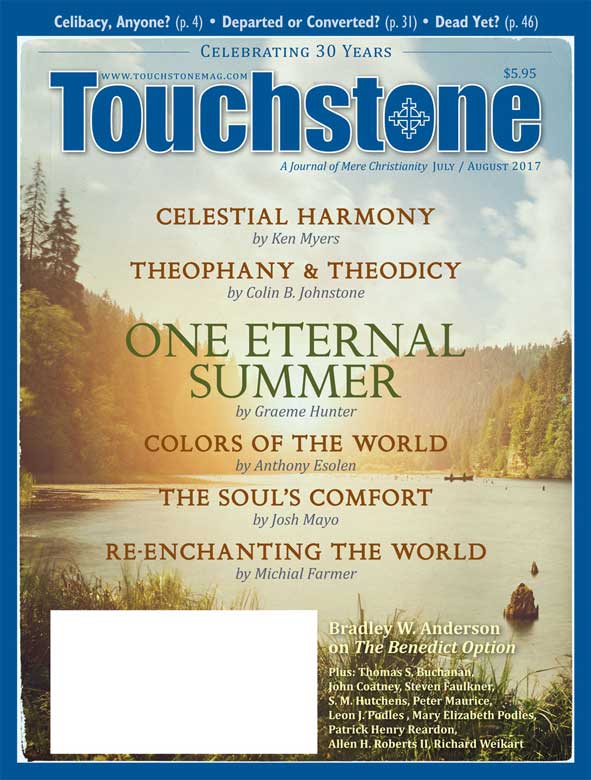Feature Review
Choosing the Good Portion
Rod Dreher's The Benedict Option: A Strategy for Christians in a Post-Christian Nation
When Francis Schaeffer, the popularizer of a movement to put Evangelicalism onto a more solid intellectual footing, created his 1976 book and accompanying film series taking a longer view of the conflicts of his day, he titled it How Should We Then Live? Schaeffer was asking a question that might have seemed odd to Evangelical audiences at the time. After all, most Americans, regardless of how they did live, had not yet begun to question openly the basic moral directives of how Christianity says one should live. And many a mother in the pews would have had a sharp and pithy answer to such a question asked in isolation, with no help needed from an eccentric-looking, lederhosen-clad man. There was, however, much more to Schaeffer's question, because behind all of his work was the presupposition that his Evangelical audience didn't realize what kind of an existential threat had hit them in the 1960s and was going to go on hitting them, both in their internal theological world and in what would later become known as the culture wars.
In The Benedict Option (Sentinel, 2017), Rod Dreher asks the same basic question some forty years after Schaeffer's query, this time in a setting of what he unapologetically asserts is a time of existential threats to Christianity that are beyond anything that has been seen since the crumbling, more than a millennium and a half ago, of Roman institutions that Christianity inherited during its rapid ascendancy. Schaeffer, true to his formation, looked back to the Reformation for his answers. (I recall that when I was studying in Germany in the mid-1980s, I lent How Should We Then Live? to my agnostic Scottish flatmate, a doctoral candidate in medieval history, whose cutting response after reading it was, "If you're going to write a book that says the Reformation was good and everything else is bad, you should just say that.") For his own inspiration, Dreher looks back to the sixth-century St. Benedict of Nursia, whose Rule came to dominate all of monastic life in Western Europe.
Escape or Preservation?
While a Protestant reading the title might wonder otherwise, The Benedict Option is an ecumenical book in the best sense of the word, written for Protestants, Roman Catholics, and Orthodox alike. Part of this is because the author himself has an eclectic background, growing up in a mainline Protestant world in Louisiana, converting to Roman Catholicism as a young man, then coming to embrace Orthodox Christianity in more recent years—with each step on the journey seeming to be prompted by positive motivations rather than reactions against what came before. But perhaps more than any personal factors, it is the times themselves that drive Dreher's broadly catholic approach. For those who would be faithful to Christianity, the comforts of camaraderie can be hard to find, and kinship must be clung to wherever it can be found.
From the start, Dreher doesn't mince words about what he thinks is at stake, nor does he temper a sense of urgency in addressing it. In the introduction, he notes that Christ "did not promise that Hell would not prevail against His church in the West." Even stronger words: "There are people alive today who may live to see the effective death of Christianity within our civilization." And, "barring a dramatic reversal of current trends, it will all but disappear entirely from Europe and North America. This may not be the end of the world, but it is the end of a world, and only the willfully blind would deny it."
Some of the early critics of the concept of Dreher's "Benedict Option" reacted against what they saw as a "head for the hills" mentality. Such criticisms have provoked a strong, even irritable, response from Dreher, who correctly points out that he is advocating no such thing. In fairness to said critics, though, if one chooses to name one's proposal after a monk who quite literally fled Rome for the Apennine Mountains at the close of the fifth century to live in a cave (and when one of your chapter subheadings is entitled "Turn your home into a domestic monastery"), an author should perhaps be prepared to take such critiques in stride. Presumably, the potential distractions of choosing someone like St. Benedict as a jumping off point were worth the benefits. Or maybe Dreher didn't really think that part through.
After all, the choice of St. Benedict came to the author not through an immersion in the writings of the Fathers but rather from the closing passage of a book by Scottish philosopher Alasdair MacIntyre, After Virtue, in which he talks about the responses of "men and women of good will" who, during a period of decline and fall in their civil society, "turned aside from the task of shoring up the Roman imperium and ceased to identify the continuation of civility and moral community with the maintenance of that imperium." MacIntyre concludes:
This time, however, the barbarians are not waiting beyond the frontiers; they have already been governing us for quite some time. And it is our lack of consciousness of this that constitutes part of our predicament. We are waiting not for a Godot, but for another—doubtless very different—St. Benedict.
At the heart of Dreher's "Benedict Option" is a belief that the culture war is over and traditional Christianity has lost, decisively and permanently (for the practical purposes of anyone alive today). The tide has irrevocably turned. Not only will Christians in the future lack even passive support from a Western culture that until recently was dominated by unconscious but real remnants of Christian sensibilities, but we will be actively assaulted in ways that will make it difficult for a historically recognizable Christianity to
survive:
[W]e in the modern West are living under barbarism, though we do not recognize it. Our scientists, our judges, our princes, our scholars, and our scribes—they are at work demolishing the faith, the family, gender, even what it means to be human. Our barbarians have exchanged the animal pelts and spears of the past for designer suits and smartphones. (17)
Bradley W. Anderson writes from South Lake Tahoe, California. His feature article, "Kramer's Criteria," was the cover piece for the July/August 2013 issue of Touchstone.
subscription options
Order
Print/Online Subscription

Get six issues (one year) of Touchstone PLUS full online access including pdf downloads for only $39.95. That's only $3.34 per month!
Order
Online Only
Subscription

Get a one-year full-access subscription to the Touchstone online archives for only $19.95. That's only $1.66 per month!
bulk subscriptions
Order Touchstone subscriptions in bulk and save $10 per sub! Each subscription includes 6 issues of Touchstone plus full online access to touchstonemag.com—including archives, videos, and pdf downloads of recent issues for only $29.95 each! Great for churches or study groups.
Transactions will be processed on a secure server.
more on book reviews from the online archives
more from the online archives
calling all readers
Please Donate
"There are magazines worth reading but few worth saving . . . Touchstone is just such a magazine."
—Alice von Hildebrand
"Here we do not concede one square millimeter of territory to falsehood, folly, contemporary sentimentality, or fashion. We speak the truth, and let God be our judge. . . . Touchstone is the one committedly Christian conservative journal."
—Anthony Esolen, Touchstone senior editor










